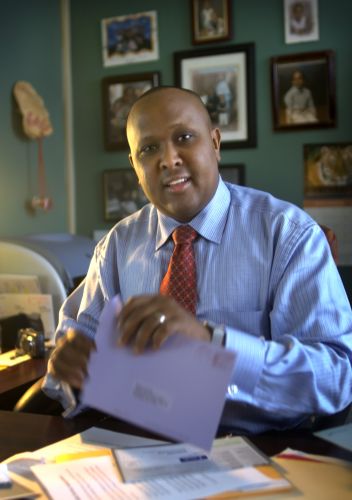
Friday, November 05, 2010
 Hussein Samatar - Photo David Brewster, Star Tribune |
He would not look back on the life he knew before war ripped apart his homeland. He would build a new life in this snowy place.
In the years that followed, Hussein Samatar learned English, earned an MBA, worked for Wells Fargo and then started his own business. Now, he's making political history.
On Tuesday, Minneapolis voters elected Samatar, 42, to the Minneapolis school board, making him the first Somali immigrant elected to public office in Minnesota and perhaps in the country. Though he ran unopposed for the District 3 school board seat, his victory nonetheless represents an important milestone for Somali-Americans.
"What you're seeing is that the community is finally becoming mainstream Minnesotans," said Sadik Warfa, one of a handful of local Somali immigrants who ran for political office this fall. He lost in his bid to oust incumbent Karen Clark as the state representative in District 61A.
Both Samatar and Warfa are members of the first waves of Somali refugees to come to Minnesota in the early 1990s. Today, Minnesota is home to an estimated 70,000 Somalis -- the largest population in the nation.
The baby-faced Samatar has emerged as one of the most influential voices in the community, forging alliances with power brokers such as Minneapolis Mayor R.T. Rybak and U.S. Rep. Keith Ellison.
The youngest of five children, Samatar grew up in an educated family in the southern part of Somalia. His father was a police administrator. His mother was a homemaker.
Samatar went on to graduate with an economics degree from Somali National University in Mogadishu.
Four days later, in 1991, the war began. Samatar did not want to leave Somalia. He had a college degree and a bright future. "But what do you do when your own country becomes nuts and people start killing each other?" he said.
He fled with his family to Kenya, where they found themselves living in a refugee camp with thousands of others.
He considers himself one of the lucky ones who made it out of the camps and to Minnesota. "Ever since, I never looked back," he said. "I did everything I could do to get an education and to get to work."
Samatar spoke four languages at the time, but English was not one of them. So he set a goal for himself to become fluent in English. It took him four years, he said, but eventually he did it and took a job with Wells Fargo. He also enrolled at the University of St. Thomas and earned his MBA in financial management in 2000.
By this time, Minnesota's Somali population had grown considerably and Samatar wanted to find ways to connect people within the Somali community. He founded "Somali Voices," a talk radio program on KFAI-FM.
For years, he hosted the show, inviting guests to discuss events and issues affecting the Somali diaspora.
"It was the voice for the community at that time," said Hashi Shafi, executive director of the Somali Action Alliance, a local nonprofit that works to involve more Somali-Americans in the political process.
Samatar's interest in community building also led him away from his corporate job with Wells Fargo and into the nonprofit world.
He is the founder and CEO of African Development Center, which offers financial education and lending assistance to immigrants who want to start businesses or own a home. He and his wife, Ubah Jama, have three children.
A credible community voice
Running for school board was not his first brush with politics. Several years ago, Rybak appointed him to serve on the library board at a time when the city libraries were about to merge with the county system. It was a contentious issue, and Samatar rose to the challenge, Rybak recalled.
"He was extremely helpful in navigating some difficult financial and political situations," Rybak said.
Over the years, the mayor has come to rely on Samatar as a wise and credible community voice. "There have been a series of issues regarding the Somali communities in Minneapolis and very often the first voice I turn to is Hussein's," Rybak said. "I quickly looked to him for more than just his views on Somali issues and on issues in the city in general."
He predicted Samatar's experience and wisdom will make him a strong school board member. "As this community ... wrestles with how to inspire a next generation of immigrants from everywhere, as we try to look at how schools can help move people into the middle class, Hussein is a wonderful role model."
With the election won, Samatar is now focused on one of his top priorities: improving education for immigrant students who are learning English. "I really feel that we have neglected the [English language learner] community," Samatar said.
He plans to push the district to spend more for ELL programs to serve the large and growing ELL population in the city schools. He also wants the board to commission an outside study of ELL services and how they can be improved. "If we don't do it right, we're never going to close the achievement gap," he said.
In the few days since his historic win, the magnitude of being the first in his community to hold a political office in Minnesota has started to sink in. Again, he's not looking back but forward.
"What I hope to do is to make the doors open" for others, Samatar said. "Hopefully the second and the third and the fourth will be business as usual."
Allie Shah • 612-673-4488